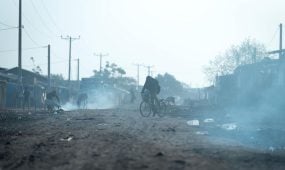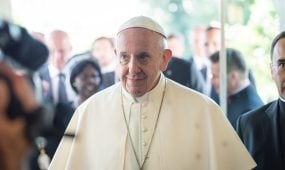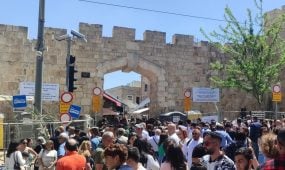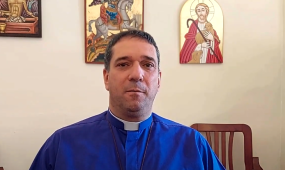Bedouin woman: “When there is no water, what else can I do?”
News
Um Ismail, in her 50s, loves her children fiercely and wholly, as mothers do all over the globe. But for Um Ismail, who lives in the Khan Al-Ahmar Bedouin community, finding enough water for her 10 children makes daily life impossible for her family
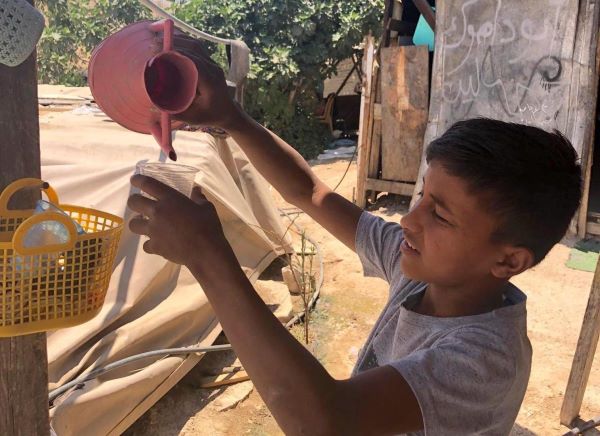
Um Ismail, in her 50s, loves her children fiercely and wholly, as mothers do all over the globe. But for Um Ismail, who lives in the Khan Al-Ahmar Bedouin community, finding enough water for her 10 children plunges the family daily into near catastrophe.
The Khan Al Ahmad village is located near Jerusalem, between the Israeli settlement of Ma’ale Adumim and one of its suburbs, Kfar Adumim, near the Jerusalem-Jericho Road. It is one of several Palestinian communities facing forced relocation because it falls within the “E1” plan that would link the Israeli settlements with West Jerusalem, cutting East Jerusalem off from the rest of the West Bank.
For Um Ismail, her husband and her children, this bears out in an increasingly difficult daily life. Simply finding fodder for their small flock of 15 sheep is nearly impossible. “We are always here because we have nowhere else to go,” she said. “Some people do not know the harsh living conditions here.”
She’s tired of people portraying the Bedouin community members as sitting around under the trees. “What happiness are they talking about?” she asked. “I am fed up with the difficulties here.”
The local health clinic increasingly lacks the resources necessary to function at all, said Um Ismail. “The other day my daughter fell ill, and we took her to the clinic, and they said that she needed medicine—which they did not have,” she said.
Between the noisy main road running nearby her house, electric fences set up by Israeli security, and increasingly expensive fodder, Um Ismail’s daily life has become extraordinarily difficult. “If you want to venture out, the Israeli security forces, settlement guards, and settlers will come to you,” she explained. “I worry about my children—that they will be beaten.”
Advertisement
She has stopped sending her son to graze the sheep but sends her seventh-grade daughter instead. “I say that, when they see a little girl maybe they will have mercy on her,” said Um Ismail. “But all of this is no good.”
She asks the world: “Do you call that living?”
She hovers under trees watching worriedly for her children, “I remain nervous and worried that the Israeli security forces, settlement guards, and settlers will come after one of my sons,” she said. “We used to have lots of sheep in the past, but we had to sell it because of the living conditions here.”
She believes the Israeli government wants to evict her family—and that they are restricting life’s necessities as a form of oppressive punishment. “They confiscated the wood we use for cooking, and the water containers, too,” she said. “They are making our life impossible.”
When will life get better? “Oftentimes we wish that we will die and thus end all the suffering,” she said, recalling days when getting water was a bit easier.
Advertisement
“We do not haul water,” she explained. “In the past, we used to do that—until 16 years ago we used to go on donkeys to where the water is.”
But now all the family has is a small water pipe—a pipe sometimes without water in it.
“When the men bring water storage containers, the Israelis come and confiscate these,” she said. “I cannot ask my husband about it, because he is so tired of this.”
She really wants to know: “When there is no water, what else can I do?”
The family has resorted to keeping water for drinking, and avoiding bathing or cleaning. “We try to find water to fill a small bucket that we have, which in no way meets the needs of 10 children,” she said. “We want justice—we want a water pipe that meets our needs.”
Every day, no matter how hard life gets, her children still bring her hope. “I am living for my children and I draw strength from them,” she said. “But honestly, I want to see results. I want to have enough drinking water.”
She urged people across the world to listen to her story, to pray and, most of all, to act for justice. “We have lots of worries,” she said, “but we hope that you can help us.”
WCC’s Ecumenical Accompaniment Programme in Palestine and Israel
First published on the World Council of Churches website on 9 June 2022.

